So You Want To Become a Farmer?
Things I hear on the farm: “I have a dream of having my own small farm, I love it.” Or “I have 5 acres and I’d like to try and figure out what to grow on it.” Or “I have a small garden and a few fruit trees, I’d like to learn more.”
Note: if you’re wanting to become a farmer (in your backyard or “acreage”), it doesn’t take a career in agriculture like I share below. With a strong “why” and help from mentors and other resources – you too can become a farmer. The World needs it.
How Did My Experiences Allow Me to Become a 1st Generation Farmer…?
I was 4 years old out in the pasture with our goats – that’s literally my first childhood memory. I remember vividly recalling a vision of having a big barn someday and the excitement of growing and producing things for people. Growing up without a father and living in 31 houses before I was 18 created a hunger for connection and mentorship. My Grandfather (Denny) spent so much time with me growing up – amen for mentors. He taught me how to drive tractor along with 100’s of hours of strategy and life lessons. Then, Future Farmers of America (FFA) was where my passion for agriculture really blossomed. I showed and raised sheep, goats, pigs and cattle – plus participated in Parliamentary Procedure (1995 top ten), Livestock Judging, Agribusiness and more with a great Ag Teacher Mr. Greg Pile and Mr. Buddy Miller. It was an amazing growth opportunity. It also put me in the midst of some great people (its where I met Jeana for the first time). In fact these people I was surrounded by were the only reason I applied for and attended WSU.
I was fortunate enough to earn a BS in Agricultural Economics and MS in Crop Science at WSU in Pullman. There again I was surrounded by great people and was exposed to the world of farming. Great professors like Dwayne Miller, Steve Jones (graduate professor), Joe Yenish (graduate professor), Bill Pan, Alan Busacca, Tim Murray, Ray Folwell (my undergrad advisor), Herb Hinman – left lasting impressions and provided needed coaching. Then throw in about a year with Ste. Michelle Wine Estates – and my passion for wine and farming took off (thanks Ed Doherty & Kevin Corliss). In 2002 I went to work for Syngenta and again was put into a group of folks with amazing standards and experience. Thank you, Cary, Evan, Ric, Scott, Michael, Eric, Chuck, John, Steve, Corey, Ryan, Josh, Casey, Gil, Mary, David, Chip, Tony, Jon, Vern, Jamie, Lisa, Lyle, Mark, Patrick, Doug, Ralph, Jack, Mike and so many more. My career with Syngenta spanned four states (WA, NC, TN & CA) and many crops – potatoes, wheat, all kinds of veggies, cotton, peanuts, tobacco, almonds, walnuts, pistachios, wine grapes and tree fruit via various leadership roles in both sales and marketing. I had the chance to work with growers of all sizes and in so many different states including trips to Mexico and Europe. One fun grower memory that sticks out is drinking Schlitz beer (the every other letter beer) in a tiny farm building with the largest U.S. Pecan grower in Las Cruces, New Mexico. Syngenta provided a culture of high performance, intense focus on the customer and 1st in class business acumen. I even got to attend a 9 day insanely intense course at INSEAD in Fontainebleau France. Plus, found some amazing friends and mentors along the way – thanks Tom & Lisa and our always favorite Sacramento peeps.
After a great career with Syngenta I decided to scratch the entrepreneurial itch by leading a small nursery company based in California. For the next 5 years I managed operations, lead the tree fruit genetics search and literally was able to extensively travel the U.S., European and New Zealand tree fruit markets. Spending time with some amazing horticulturalists and businesspeople (thanks Todd, Brian, Dale, Ron & Rich) – what a treat it was, along with amazing learnings. One of which was a lot of fun – helping bring Cosmic Crisp® to market.
The next chapter began soon after our move to our own small farm in Manson, WA. I went to work for Wilbur-Ellis where I now serve as the Director of Marketing for the U.S. Agribusiness Division. Wilbur-Ellis is a fantastic family-owned company very focused on feeding the world and very focused on its customer.
In summary – its these experiences that have allowed the pursuit of our family becoming 1st generation farmers. The countless hours visiting farms around the world, the intense focus on crop production and quality over the years, the exposure to so many ways to produce a crop, the networking and the humble understanding that Mother Nature is in control!! Its our job as farmers to build a better ecosystem, to share knowledge and support one another. I’m now passionate about helping Wilbur-Ellis achieve its mission and passionate about connecting families who visit our farm to farming. Thank you for giving us the chance to be the connector.
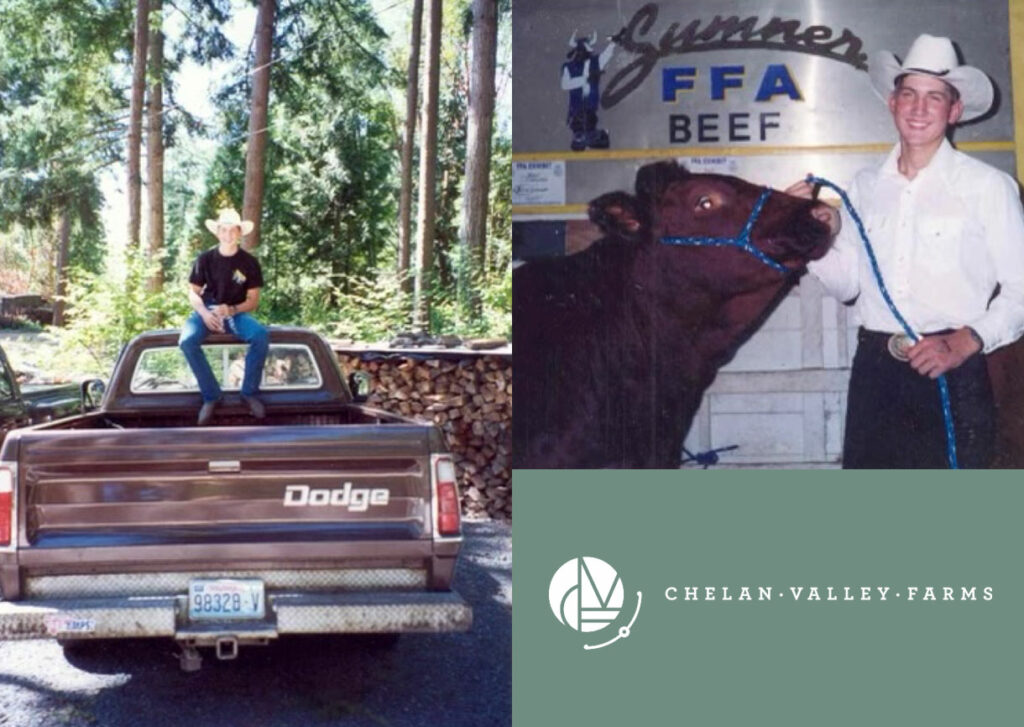
Chad and his first pick up. 1995 (left). Chad showing his Pinzgauer Heifer. 1995 (right).
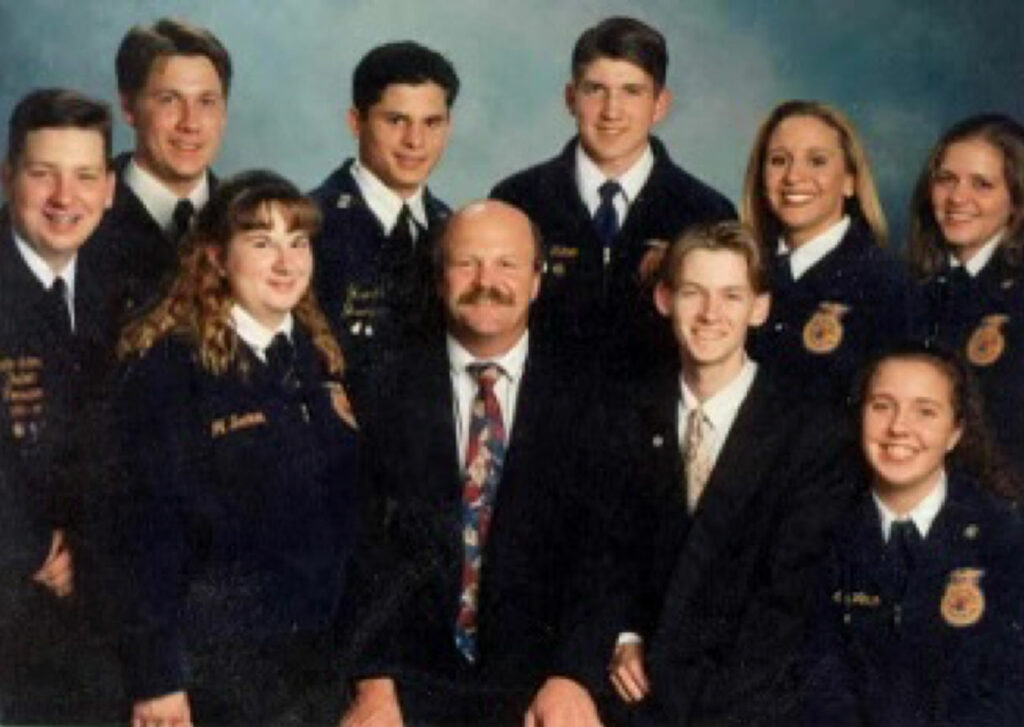
Mr. Greg Pile and the Sumner FFA Class of 1996.
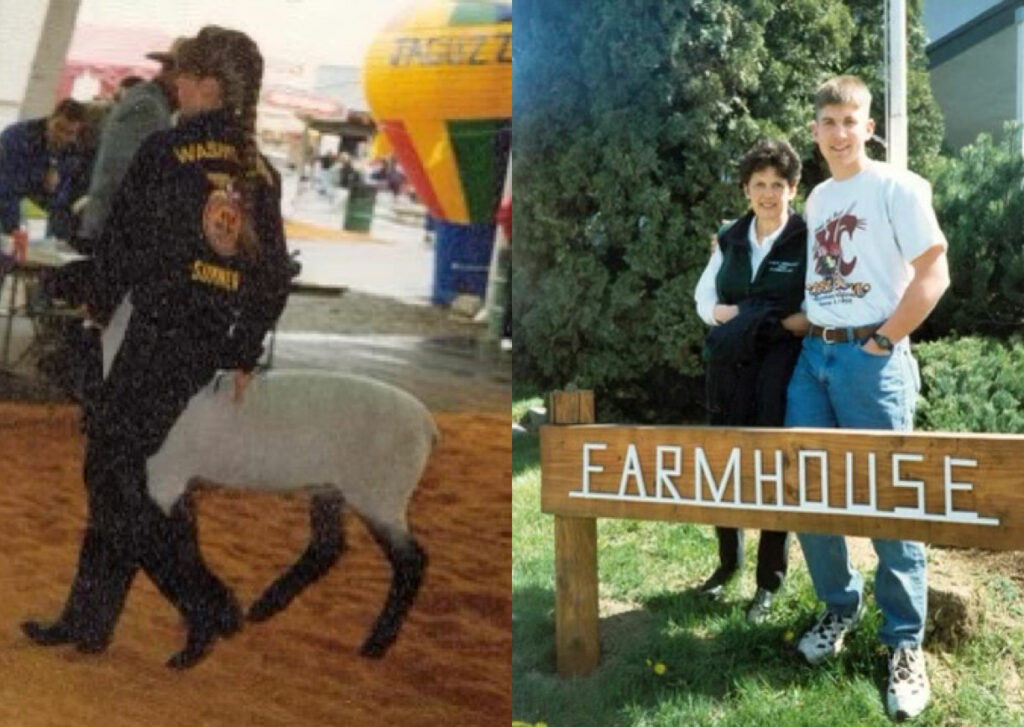
Jeana showing her sheep at the Puyallup Fair – 1998 (left). Chad and Grandma Kay – 2000 Graduation (right).
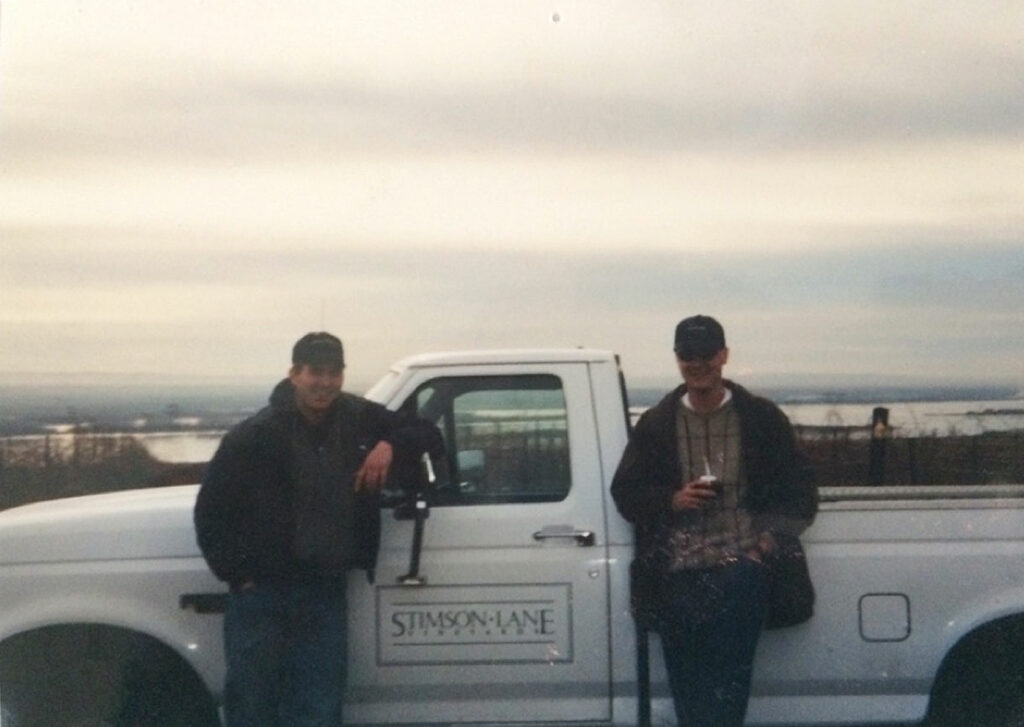
Chad and Kyle Johnson on Canoe Ridge 2001.
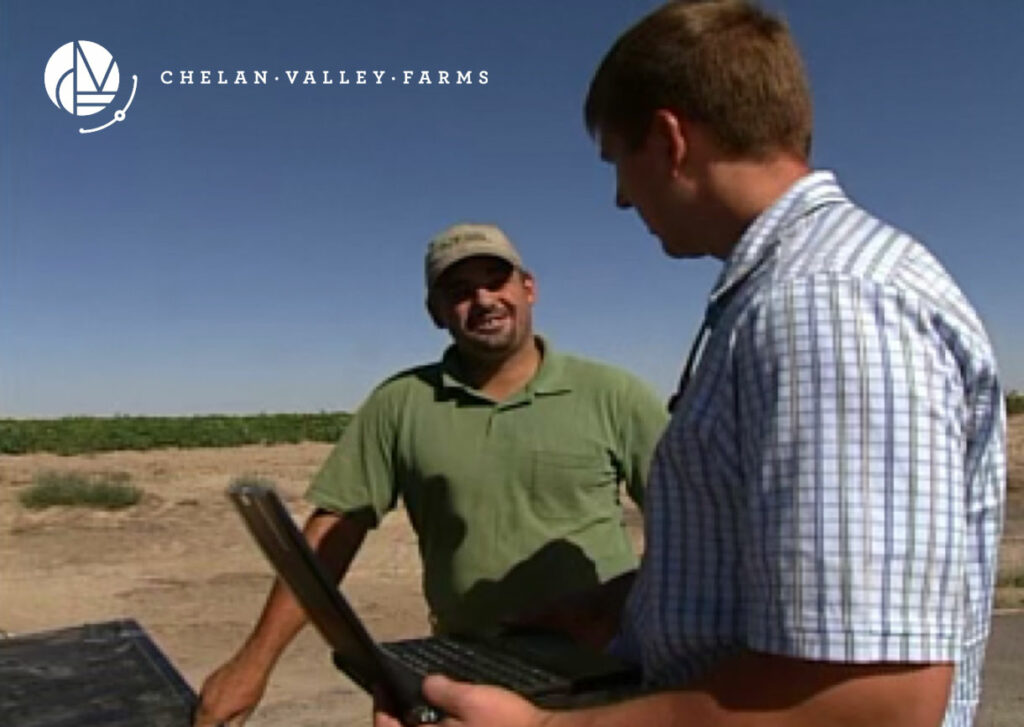
Chad working with one of his favorite growers on farm record keeping in Moses Lake, WA. 2005.
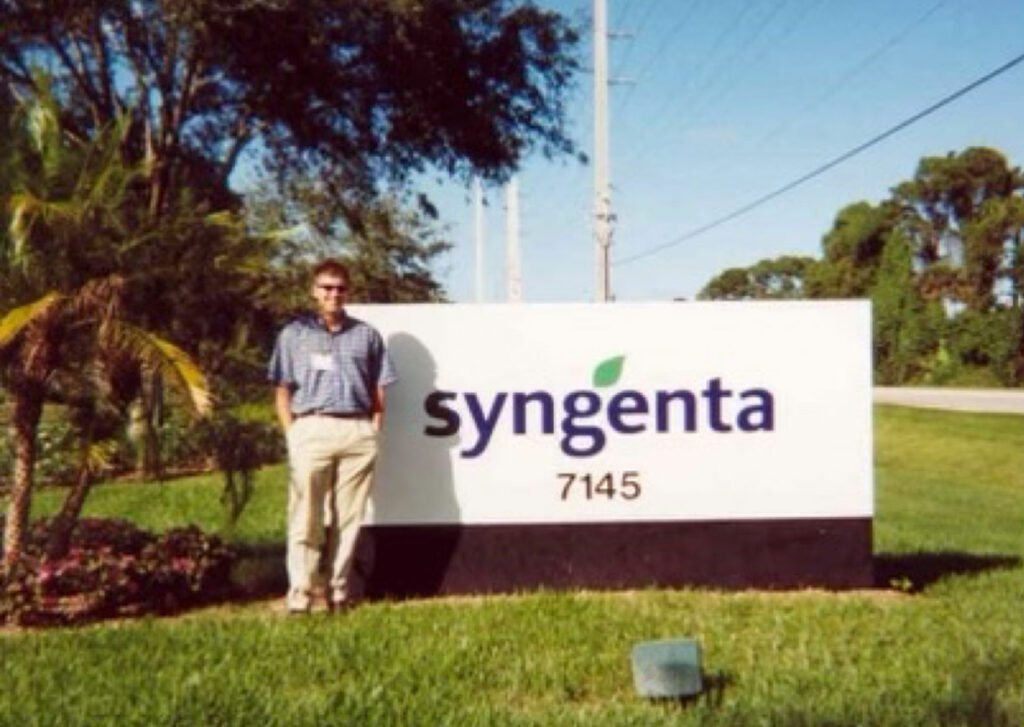
Chad in front of the Syngenta sign at the Vero Beach, FL research center – 2006. Home to some of the best scientists!
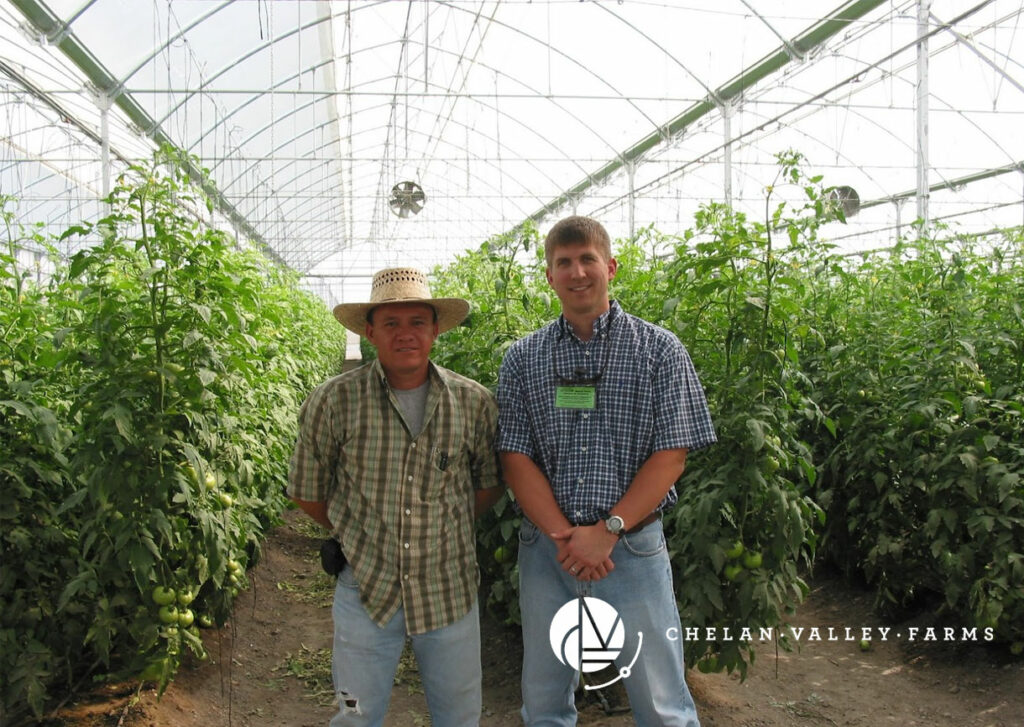
Greenhouse Tomatoes – Yurecuora, MX, 2007.
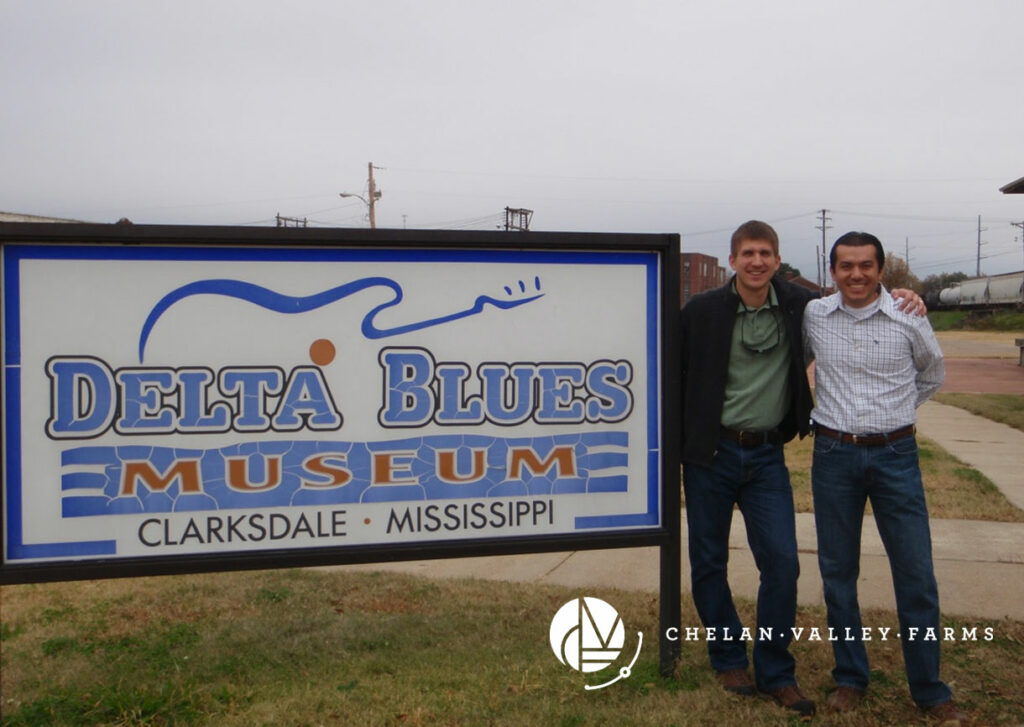
Chad’s and Rodolfo traveling the Mississippi Delta… 2008. Home of the Crossroads. An amazing cotton growing area.
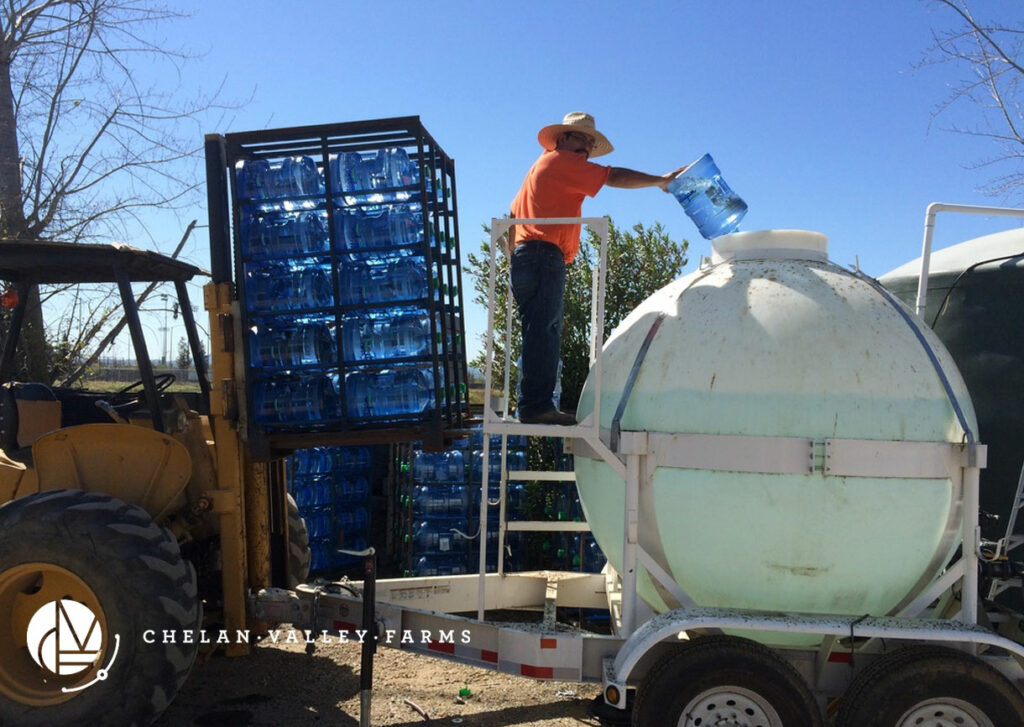
Extreme measures to save greenhouses full of plants in 2016 – Brentwood, CA. Thanks Culligan Man.
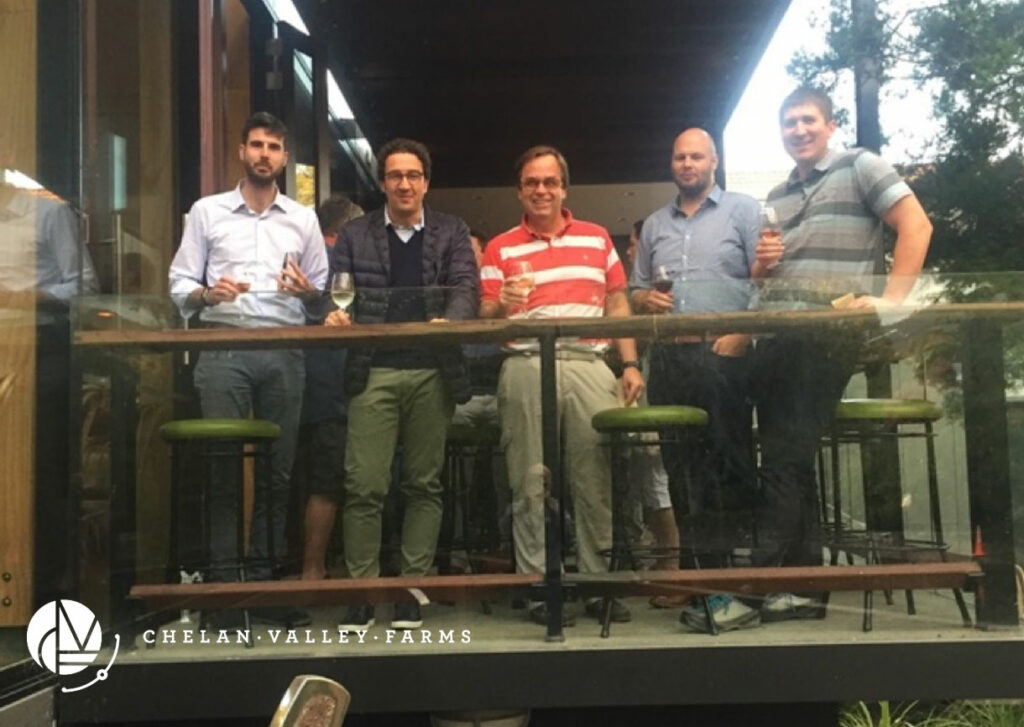
International variety chasers… Nelson, NZ 2017. A trip to discuss varieties and explore the tree fruit growing area of Hawkes Bay and Nelson.
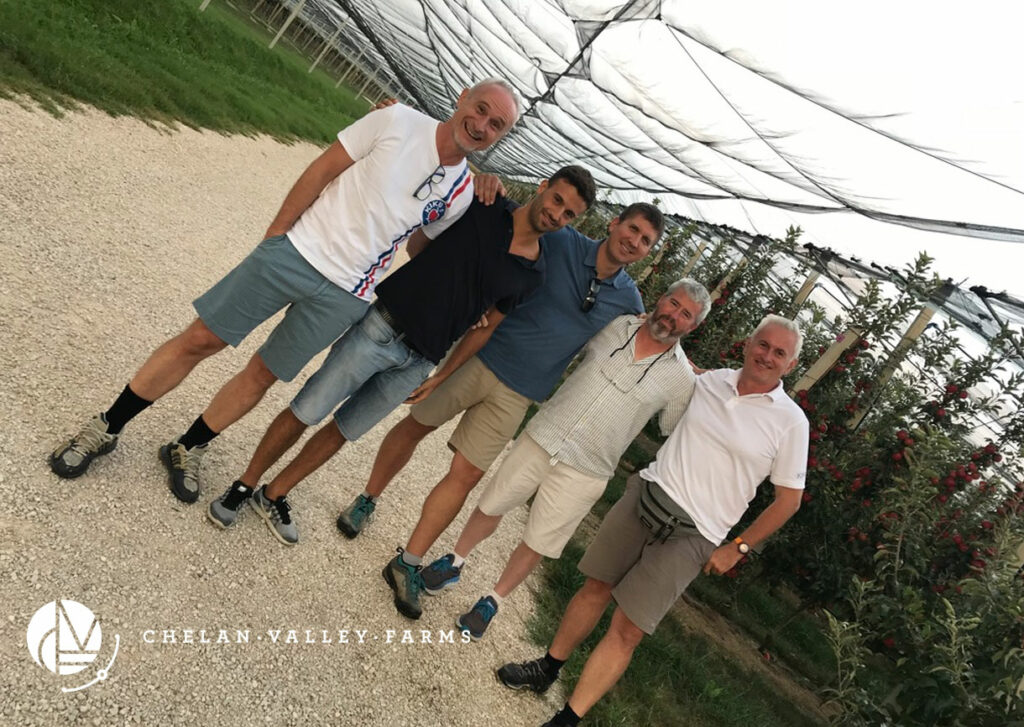
Venice Italy with some great friends and colleagues – 2018.
Why do we need more small farmers?
U.S. Farmers by the numbers (see the table below published by the USDA).
USDA considers a “farmer” anyone who reports $1,000 of Gross Farm Income or more. The blue line indicates there are about 2,000,000 farmers in the U.S.. Of that 2,000,000 only about 500,000 could be considered “commercial” size. How do the numbers look going forward? It’s been a slow decline since the 1970’s. Current surveys indicate we could be on the tipping point of many farmers not having successors and the larger farmers getting larger. So why do we need more small farmers?? I’m not against “large” farms. Large farms, like large businesses provide scale – both on economics and offerings. We need large farms to support a food system that provides us all very inexpensive food. On the other hand – I believe small farms provide diversity, they can pursue niches, they can focus on offering a product “direct” to the consumer. Some of the same things we all love when we support a small business – it helps communities thrive, its incredibly satisfying knowing our hard earned $’s are going directly to the owner. But, is it something deeper than that…? Is there something evolutionarily inside us wanting to connect to food?

Small Farms provide a great connection to food. Why is that desire for connection so strong?
I’ve spent the last couple of years trying to understand more – WHY is it people are so interested in connecting to farming and food?? The questions and reactions of visitors to the farm are so genuinely and deeply from a place of sincere interest. I’ve read books on the history of food, I’ve asked many people and come up with a few things. 1. Food is necessary for us to live, period – enough said. We need food to eat. Wanting to understand where it comes from is very natural. 2. By the numbers: in 1900 about 1/3 of the U.S. population worked in Agriculture. Today its less than 0.5% – crazy numbers. 3. Pre-1850’s over ½ the population worked in Agriculture, much of the world is still 3rd world and don’t forget about hunting and gathering. This 3rd point is about our evolution alongside food. Our ability to determine what was edible, what wasn’t, what would be available when and how we “naturally” selected varieties within species and species themselves is fascinating. In other words, we’ve evolved alongside our food far longer than we’ve been disconnected from it. Whether it’s by the numbers or because of our evolutionary roots – our need to be connected to our food and farms is real. Small farmers provide this. The time for more small farmers is now!
How to get started becoming a farmer?
Why do you want to become a farmer?
This is what will get you through the tough spots. “If your why doesn’t make you cry, there is no why”. Is it because you like creating things for people? Is there a family history? Do you crave being outdoors? Do you love growing things? Are you passionate about food? I remember getting out of college and going to work in Moses Lake, seeing how much land cost and thinking – “I’m an idiot, there’s no way I can farm, it’s too expensive to buy land.” My conclusion here – don’t ever give up. If you’ve got a strong reason why, stay with it.
For a living or for fun? How important is revenue?
Is this going to be a side project? Farming can be incredibly capital intense – it eats cash. Especially if there’s a lot of labor. Wages are high. This question is up to you. But it’s an important one. IF revenue is important – there’s another series of questions to go through. i.e. determining the size of the prize. What’s the size of the market you’re going after? Are there competitors?
Have you worked on a farm? Aka have you tried it out? This can be a great way to meet potential mentors and build a network.
Go try it. See if you like the actual work. Jeana and I both grew up around work outdoors – but in 2011 we realized we’d only made home wine, we hadn’t “worked” in an actual winery. We found an incredible producer who let us volunteer quite a bit. Enough for us to conclude – yeah, this is for us.
Does your spouse or partner want to do it?
I don’t want to get personal here, but if you’re going to jump into this – understanding your partners “why” is really important. Or, maybe you can find a way for this to be what you focus on and they focus elsewhere. In Jeana and I’s case, she’s full time on the farm and I help nights and weekends.
Where are you located or where do you want to be located?
- Will you need Irrigation? How large is the population base (unless you’re going online)?
Geography is very important. What crop options do you have? Simple things like – hey, I’d like to grow walnuts in Washington. Well, at what scale? And would you need a “huller”?? Or – I’d like to grow saffron – next question, does it require a certain amount of water that it would need irrigation? Or – I’d like to grow and sell produce at farmers markets… then, how big is your farmers market and how many people attend it?
The formula to decide where and what.
I’ve referred to this in pieces above. I’m going to oversimplify it. 1. What is your product or service? 2. What is your target market? 3. What is the size of that market? 4. What will your product or service be worth – quantity sold x price. 5. How much of the market can you expect to penetrate – i.e. are there competitors and if its an existing “market space” how much share will you earn?
Resourcefulness to get land.
With what real estate prices have done in recent years – this one is intimidating. However, there are still parts of the country with reasonable prices. But don’t give up on being resourceful. If you know where you want to farm – then find a way into the community. Join local farming groups, go to their meetings, offer to help, get connected. This can be a way to be the first to know about land for sale. And don’t underestimate the opportunity to find someone without a successor who’d love to see someone like you take on their farm. Financing is the other factor – get creative. It’s a whole other topic – but sellers can sometimes carry a note or there are programs to help farmers get started. Holler with questions.
Time horizon… and don’t give up.
When is too late?? Colonel Sanders (the KFC guy) was like 65 when he finally got things going. And there are many other great stories of – its never too late. However, a couple things come to mind. Cash flow is the first. Might seem odd to mention cash flow in a section about time horizon. Unless you’re going to take on outside investors – and you’re buying land, building stuff, needing equipment, etc. – more time might allow for greater cash reserves. I’ve also found – as time goes on, some of our assumptions are also tested. We thought one thing was going to work or be successful and it turns out not to be… so we keep evolving or “pivoting”. In other words, time can help the vision unfold.
Resources to learn while you wait:
If you want to get experience growing things, I highly recommend a concept I call “The Farmers Shadow”. If your shadow shows up on the thing your growing frequently, you’ll notice key things. The things that are very basic but critical: water, sunlight and nutrition. Showing up with the farmers shadow – you’ll notice if things are dry, if they are getting too little or too much sun or if they need fertilizer. Check out the Western Fertilizer Handbook. I highly recommend learning about soil fertility – begin with the basics (regardless if your going to be organic or conventional) and learn what your crop will need + what your soil already has.
Other Resources
Are you interested in a “become a farmer” resource package? The basics – from fertility, to sales, to how to get financing and more?
If so email jeana@chelanvalleyfarms.com
Conclusion
I sincerely hope what I’ve shared is helpful. Agritourism is what we’re passionate about and focused on. Farming is fascinating. And there’s really exciting things on the horizon. If you’re thinking of becoming a farmer – I firmly believe there’s opportunity. I firmly believe people now more than ever want to connect to their food and they want to know how its grown and they want healthy options. If we all had small farms or large gardens – that’s the holy grail of sustainability. The internet and social media are amazing tools to connect to your audience. Don’t worry about your time horizon, if your why is strong enough – for sure don’t give up on the dream of becoming a farmer. And heck, start getting experience in your backyard.
Here’s a couple of my why’s –
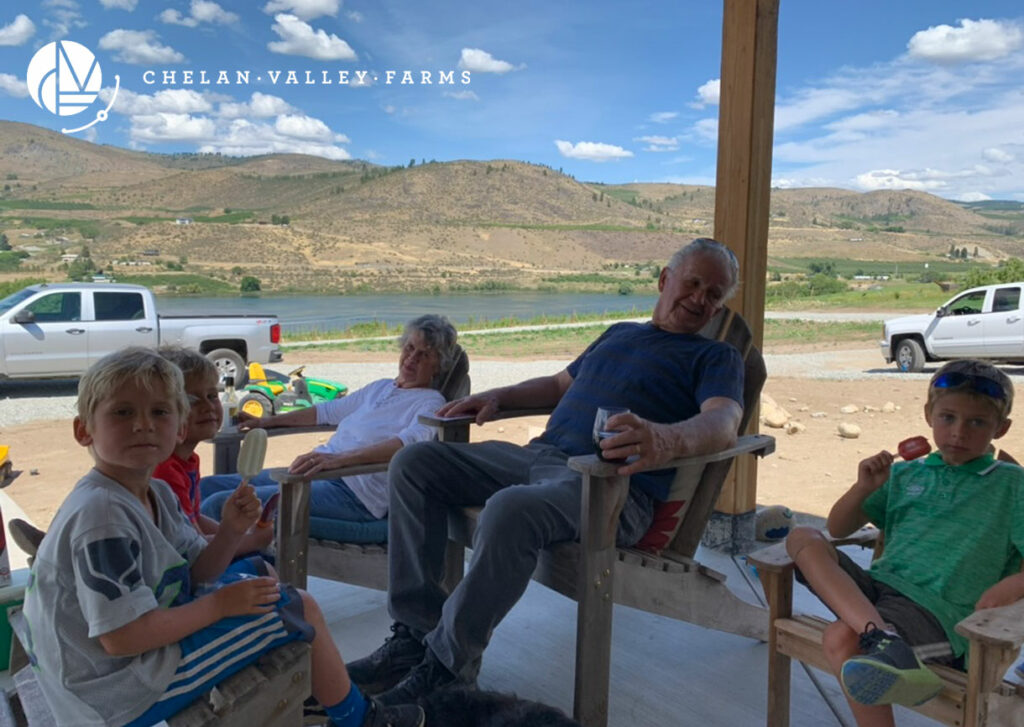
Grandpa Denny, Grandma Kay and the boys in 2019. Cheers to Grandpa – he and Grandmas encouragement and belief in us was/is amazing!!
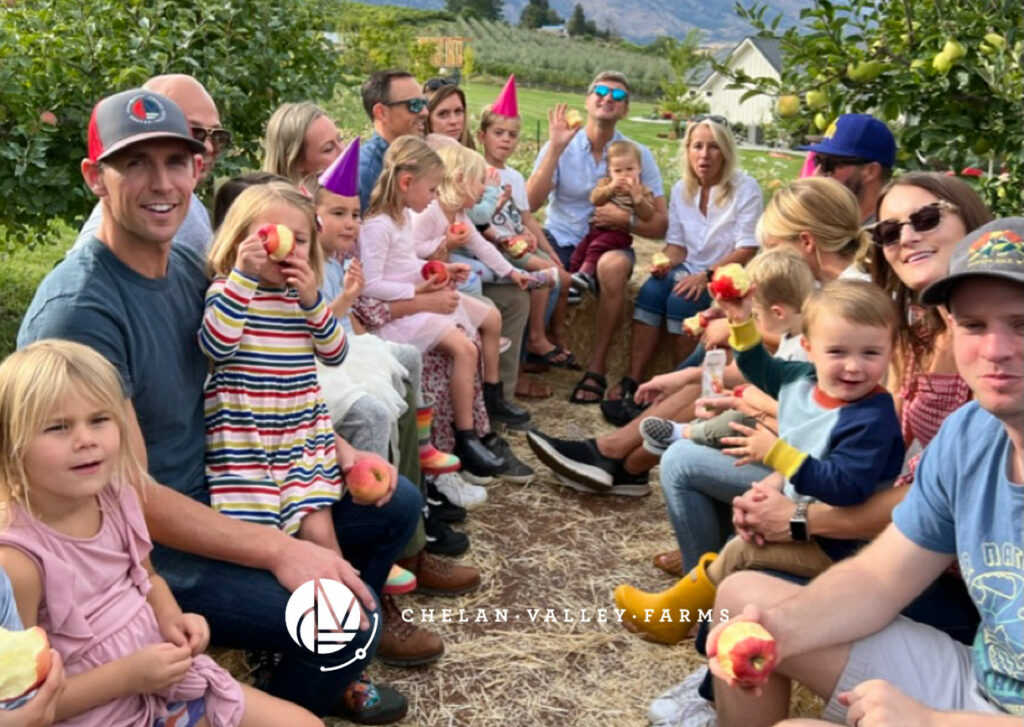
These amazing people that visit our farm!!!





Chad (and Jeana),
Thank you for your passion and for your willingness to share your journey. If you ever need help on the farm, I am happy to volunteer doing whatever you might need.
So many exciting things happening for you and your family!